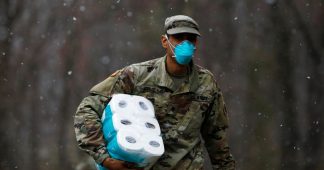May 16, 2020
Unlike the endless praises in the liberal and social democratic press in North America, the Covid-19 pandemic is relentlessly uncovering the weaknesses of the German healthcare system – the deadly consequence of two decades of neoliberal policies. Indeed, just last week the London-based Financial Times reported on a rebound of cases in Germany. Thomas Sablowski works for the Rosa Luxemburg Stiftung, a research and political education centre aligned with the German socialist party Die Linke. Thomas is a senior research fellow in the area of political economy of globalization, a member of Die Linke, and on the scientific advisory board of Attac Germany. Thomas was interviewed by Saliha Boussedra of the French journal Cause Commune in late April.
Cause Commune (CC): There have been far fewer deaths in Germany than in France. How do you explain this?
Thomas Sablowski (TS): We still know relatively little about this new corona virus and the dynamics of the Covid-19 pandemic. Comparisons between countries are difficult because the testing practices in the countries are very different. The numbers of unreported cases of Covid-19 might vary from country to country. The testing practices are also different with regard to the analysis of the causes of death. However, one hypothetical explanation for the apparently lower number of deaths from Covid-19 in Germany could be that in the initial phase of the pandemic in Germany, younger people could have been more seriously affected than in France. Many cases occurred during skiing holidays of Germans in Austria. This would mean that older people could have been affected more at a later stage of the pandemic after which the death rate rose in Germany, as well.
Another explanation is that the death rate depends very much on the situation in the hospitals and in residential homes for the elderly: Is there enough capacity for intensive care in the hospitals? Are there enough ventilators? Are there enough protective masks and protective clothing for the doctors and nurses working in the hospitals and for caregivers of the elderly? When high-risk groups such as the elderly and people with chronic diseases are consequently not protected, the death rate can rise quickly. The same holds if the hospitals are overloaded or not equipped well: The death rate rises quickly, and even the employees in the hospitals are getting infected to a high degree. Fortunately, it seems that Germany has avoided, more or less, an overload of the hospitals, so far. German newspapers reported that an overload of hospitals occurred in the region Grand-Est in France and that there was no more care for elderly above 80 years because of a lack of ventilators.
CC: Germany’s ability to quickly redirect its industry played a role in managing the crisis. How do you explain that Germany has managed to preserve its industrial fabric?
TS: I am not sure to what extent there really was a redirection of the industry in Germany during the crisis so far. The media reported that some firms have now started producing protective masks instead of t-shirts, or ethanol for disinfection instead of liquor. However, we should not overestimate this conversion of the industry. The German government, in fact, took a very liberal stance and did not intervene in the private production sector. Of course, the government looked for manufacturers of protective masks and protective clothing when it became evident that there was not enough material even for the employees in the hospitals. However, the government did not force private companies to redirect their production, which it should have done, in my opinion. The result is that we are still lacking protective masks for the whole population. The government first told the people that protective masks do not help much, probably because it wanted to keep all available masks for the hospitals, the police, etc. Now the government is changing its policy. Now we are forced to use masks in supermarkets and on public transport, even if we have only provisional masks.
It is true that Germany has managed to preserve an industrial fabric to a higher degree than France. However, you have to keep in mind that the productive apparatus of Germany was broader and more integrated than the productive apparatus of France even before the process of neoliberal globalization and financialization of the economy started in the late 1970s. Germany had, and still has, a specific strength in the machinery industry, which has developed over the course of a 150 years. The machinery industry is important because the increase in labour productivity in the whole economy depends on it. The French political left had already discussed in the 1970s how France could become less dependent on Germany and the USA with regard to industrial equipment. The German government could blackmail the left French Government under Mitterrand because of its economic policy at the beginning of the 1980s: France had trade deficits, which were partly due to the weakness of the French productive apparatus.
The German economy also has a broader stratum of medium-sized companies, while France depends more strongly on a smaller number of giant corporations. The French state has for a long time focussed on promoting these “national champions”, as far as I know. The composition and strategies of the national labour movements probably also play a role. In Germany, we have unitary trade union organizations dominated by a social-democratic reformist orientation. The trade unions were always inclined to make compromises with the capitalists in order to keep workers’ jobs. The majority of the labour movement accepted the competitiveness of German industry in the world market as a precondition for any progress. In the last decades, the trade unions accepted many concessions in order to keep jobs in Germany.
However, even the German productive apparatus was hollowed out due to the internationalization of production and race across the globe for higher profits. We depend almost totally on protective masks manufactured in China and India, for instance. The same holds for key drugs. Even before the Covid-19 pandemic, there was a shortage of important pharmaceuticals in Germany. Now even some conservative politicians seem to have changed their minds. They have begun to realise how important the secure provision of basic goods can be. However, this change of mind is limited. The left is struggling for higher public investment in the social infrastructure and for an industrial conversion based on the needs of the people and ecological necessities.
We have to redirect our productive apparatus away from useless and harmful products, away from weapons, luxury cars, etc. German society has become increasingly dependent on the car industry over the last years, and this is really a serious social and ecological problem.
CC: There are two health systems in Germany – public and private. What consequences has this had for patients?
TS: The various governments in Germany have enforced a neoliberal policy in the area of public health as they have in other areas for many years now. In the year 2000, the government formed by the Social Democrats and the Green party changed the financing of the hospitals fundamentally and introduced Diagnosis Related Groups (DRG). Since that time, the hospitals get a lump sum for each patient based on the diagnosis. This system of financing does not cover the necessary costs of the hospitals and has created permanent pressure to lower costs. In turn, this has led to a serious lack of nurses, for instance. The remaining nurses are underpaid and overworked. In order to cover their costs, the hospitals have to process a higher number of patients and to dismiss patients earlier. While patients remained in a hospital on average 14 days in 1991, today they remain only 7 days on average.
At the same time, the central government has shifted many social responsibilities onto local governments without increasing the financing of the municipalities sufficiently. Many municipalities have been underfunded for many years. That is why many communes privatized their hospitals over the last few decades. The share of private hospitals in the total number of hospitals increased from 14,8% in 1991 to 37.1% in 2017. Today, even the majority of the public hospitals are organized under the auspices of private law. Because of these processes, the total number of hospitals also declined from 2,411 in 1991 to 1,942 in 2017. The number of available beds in hospitals per 100,000 inhabitants declined even further from 832 to 602. As recently as last year, Bertelsmann Foundation, one of the most influential neoliberal think-tanks in Germany, told us that we would still have too many hospitals in Germany and proposed to close more than 800 of the remaining hospitals.
We also have two forms of health insurance. Ordinary wage earners with a gross wage of less than 4,687.50 Euros per month have to join a compulsory public health insurance. People with a higher income and the self-employed (the petty bourgeoisie and the bourgeoisie) can use private health insurance or pay a doctor, or for a hospital stay, on their own. As people with private health insurance often get a preferential treatment, we are talking about a two-tier health system. As in other countries, health is a class-issue in Germany. The working class suffers from bad working and living conditions more than other classes. Poor people have a much lower life expectancy than the rich do. We have no data yet, but I assume that the death toll of Covid-19 will also be higher among the proletariat.
CC: We are talking about many poor workers in Germany, a lack of nurses and a shortage of masks. Could you tell us more about this?
TS: Although the German government did develop a plan for dealing with a possible pandemic already in 2012, it did not stick to its own plan and did not really prepare for this case. That is why we now have a lack of protective masks, protective clothing, ventilators, basic pharmaceuticals, etc. Like in other European countries and in the USA, the German government hesitated to react adequately. The Chinese officials informed the World Health Organization about the new lung disease on December 31, 2019. On the same day, the authorities in Taiwan started taking the temperature of all people coming from mainland China.
Not so in Germany. On January 23, the Chinese authorities started the lock-down in Wuhan. At that time 17 deaths were reported in China. Nothing happened in Germany. On February 22, the lock-down started in Italy. Nothing happened in Germany. Only when the number of reported infections started to increase in Germany, on February 27 the government established a task force on Covid-19, considering measures for containment. It took again more than one week until the government recommended on March 8 to ban public events with more than a thousand participants. Only in mid-March did the central government and the regional governments take comprehensive measures like the closing of shops, schools and nurseries.
However, contrary to Italy and Spain, the German government did not enact even a partial lock-down of industrial production. Workers were required to abstain from almost all social contacts in their free time, but had to continue exposing themselves to the risk of infection during work. This reveals that the capitalist state in Germany, like in other countries, is caught in a contradiction: On the one hand, it has to take measures in order to contain the pandemic and to secure the general conditions of production, in particular the health of the workers. On the other hand, it hesitates to apply appropriate measures in order to allow for the continuity of the production and valorization of capital. The strategy of the German government seems not to be stopping the pandemic, but to slow it down and to use the hospitals as much as possible in order to avoid a rupture of production.
Germany is better off than other countries because it occupies a position at the top of the hierarchical international division of labour. This has enabled the German government to mobilize economic aid programs for companies (mainly credits and guarantees) with a volume of about 7 per cent of GDP, so far. This is far more than in Italy, for instance. However, these measures will just postpone and ease, but not avoid, the coming wave of bankruptcies.
The Covid-19 pandemic is hitting German society like other societies after 40 years of neoliberal ‘reforms’. Social inequality has increased very much. Germany has one of the largest sectors of low-wage employment in Europe. The workers with precarious part-time and temporary contracts are most vulnerable with regard to the present crisis, which is the deepest crisis since the Second World War. The neoliberal policies have partially destroyed our healthcare system. That is why we are short by more than a hundred thousand nurses. Hundreds of workplaces within the local public health authorities have disappeared over the last few years. The consequence is that the German state is unable to test the population comprehensively and promptly for Covid-19. It is also still unable to provide the population with protective masks because it does not want to challenge private authority in the economic sphere.
CC: Do we know the real number of deaths in Germany due to Covid 19 since there is no post-mortem test?
TS: Yes, you are right. We do not know the number of cases of unreported deaths. As I said before, test practices are different from country to country, and they are changing over time, which makes comparisons between countries difficult. For instance, the Robert-Koch-Institute, the main national medical institution in charge of the monitoring and containment of the pandemic, first said that post-mortem examinations would not be necessary. The Robert-Koch-Institute even recommended against post-mortem examinations because they could lead to infections of the medical personnel. Only recently, the people in charge have changed their minds. Now they recommend doing post-mortem examinations in order to learn more about how the virus affects the human body.
CC: From what I understand, according to the German left, hospitals are on the verge of collapse following this health crisis, what do you think?
TS: The doctors and the nurses had already been on the verge of collapse before this health crisis because of the severe lack of personnel in the hospitals. One of the most important struggles of the last few years in Germany was, and still is, the struggle for more personnel and for better pay for nurses in the hospitals. In the past, the hospital staff was not known for strikes. However, over the last few years, workers in the hospitals learned to strike. In the largest hospital in Berlin, the German capital, nurses struck successfully for a collective agreement defining a minimum number of nurses in each ward. This struggle had a nationwide vibrancy and led to a series of struggles in other hospitals.
The German government is following a risky course regarding the Covid-19 pandemic. First, it delayed the measures to contain the pandemic. Then it took half-hearted measures. Now it is already relaxing the original measures. So far, an overload of the intensive care units has largely been avoided. However, if we see infections rising again, we also could experience in Germany what we have seen in France and Italy: wartime practices of ‘triage’, meaning a carnage that could have been avoided under different social conditions.
The Covid-19 pandemic is relentlessly uncovering the weaknesses of the German healthcare system and the deadly consequences of neoliberal policies. The good thing is that we maybe have the chance to change the system fundamentally. We need to struggle for the abolition of the DRG system and for a completely new funding structure for hospitals and the public health system.
We also need to struggle for the socialization of private hospitals. We have to bring them back into public communal ownership. We need to struggle for more nurses and for better wages for nurses and care workers.
Finally, we have to put these struggles in the broader framework of the struggle for the eco-socialist transformation of society. However, we will not be successful in this struggle if we allow capitalists and governments to play workers in different nations off against each other. We also need an internationalist perspective. •
This interview first appeared in French in the journal Cause Common.











